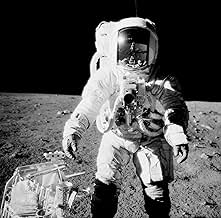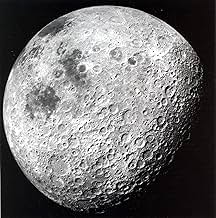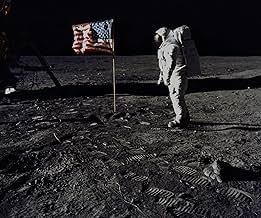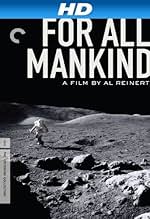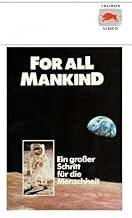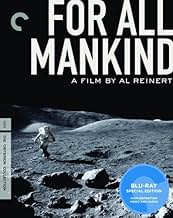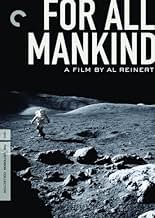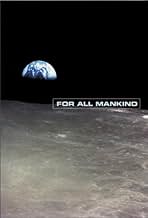AVALIAÇÃO DA IMDb
8,1/10
6,9 mil
SUA AVALIAÇÃO
Adicionar um enredo no seu idiomaAn in-depth look at various NASA moon landing missions, starting with Apollo 8.An in-depth look at various NASA moon landing missions, starting with Apollo 8.An in-depth look at various NASA moon landing missions, starting with Apollo 8.
- Indicado a 1 Oscar
- 3 vitórias e 3 indicações no total
Jim Lovell
- Narrator - Apollo 8, Apollo 13
- (narração)
- (as James A. Lovell Jr.)
Ken Mattingly
- Narrator - Apollo 16
- (narração)
- (as T. Kenneth Mattingly II)
Russell Schweickart
- Narrator - Apollo 9
- (narração)
- (as Russell L. Schweickart)
Eugene Cernan
- Narrator - Apollo 10, Apollo 17
- (narração)
- (as Eugene A. Cernan)
Mike Collins
- Narrator - Apollo 11
- (narração)
Charles Conrad
- Narrator - Apollo 12
- (narração)
- (as Charles P. Conrad Jr.)
Richard Gordon
- Narrator - Apollo 12
- (narração)
- (as Richard F. Gordon Jr.)
Alan Bean
- Narrator - Apollo 12
- (narração)
- (as Alan L. Bean)
Jack Swigert
- Narrator - Apollo 13
- (narração)
- (as John L. Swigert Jr.)
Stuart Roosa
- Narrator - Apollo 14
- (narração)
- (as Stuart A. Roosa)
James Irwin
- Narrator - Apollo 15
- (narração)
- (as James B. Irwin)
Charles Duke
- Narrator - Apollo 16
- (narração)
- (as Charles M. Duke Jr.)
Harrison Schmitt
- Narrator - Apollo 17
- (narração)
- (as Harrison H. Schmitt)
Buzz Aldrin
- Self
- (cenas de arquivo)
Bill Anders
- Self
- (cenas de arquivo)
Neil Armstrong
- Self
- (cenas de arquivo)
Stephen Bales
- Self
- (cenas de arquivo)
- (as Steve Bales)
Frank Borman
- Self
- (cenas de arquivo)
Avaliações em destaque
10bobbrown
Without repeating all the good comments that have been mentioned by earlier reviewers, I will add what is unique for me.
1. When Reinert wonderfully builds up the tension for the liftoff, it is more than a crescendo of power when those Saturn 5 rocket motors blast to life! I've had the film on VHS tape for about 10 years, and I still enjoy knocking the socks off of first time viewers when the surround sound system is allowed give its all as it shakes the house. If there were ice chunks on the outside of my house, they would surely shatter and fall just as they did from the rocket body as it slowly left the pad. UNBELIEVABLE! I once read that the Apollo rocket, if it all exploded at one time, would equal 80% of the Hiroshima atomic explosion in WW2. Imagine sitting atop that 31 story tall monster awaiting your fate on the launchpad.
2. Eno's music- just can't say enough superlatives about this soundtrack. Like good art, there is plenty there to continue to pique your interest for years. He is a gift to all mankind for his work on this soundtrack, but that is just the beginning. He's been doing that high level of work for decades!
GREAT FILM!!!
1. When Reinert wonderfully builds up the tension for the liftoff, it is more than a crescendo of power when those Saturn 5 rocket motors blast to life! I've had the film on VHS tape for about 10 years, and I still enjoy knocking the socks off of first time viewers when the surround sound system is allowed give its all as it shakes the house. If there were ice chunks on the outside of my house, they would surely shatter and fall just as they did from the rocket body as it slowly left the pad. UNBELIEVABLE! I once read that the Apollo rocket, if it all exploded at one time, would equal 80% of the Hiroshima atomic explosion in WW2. Imagine sitting atop that 31 story tall monster awaiting your fate on the launchpad.
2. Eno's music- just can't say enough superlatives about this soundtrack. Like good art, there is plenty there to continue to pique your interest for years. He is a gift to all mankind for his work on this soundtrack, but that is just the beginning. He's been doing that high level of work for decades!
GREAT FILM!!!
Great footage, but the missions are all over the place without really telling us. If you don't have a little knowledge beforhand, like Apollo 13, you're pretty much left in the dark which mission is which and may think it was just 1 mission to the moon (and back obviously). Started to really dawn on me when Apollo 13 had that breathing problem (which was solved in a jiffy in this documentary) and then a crew was going for a moonlanding ( which obviously Appolo 13 never did. But hey when you hear the name Neil Armstrong you are pretty much back on course. Ah okay great i am seeings Apollo 11 and the first moonlanding at the moment : )
Footage: 8.5 Overall Docu : 6.
Footage: 8.5 Overall Docu : 6.
I saw this film at a very, very young age and I suspect that it is the reason I developed a heavy interest in space exploration. I recently saw this again for the first time in many years since all I had was a vague recollection of it. And after watching many times since then I have no problem saying that this is one of the best documentaries ever made.
One must give the film's director, Al Reinert, at a ton of credit for his work. Who else could have come up with the brilliant notion behind this film? Who would have thought of taking footage from all of the Apollo missions (and a couple of the Gemini missions) and combining them with the words of the men who went where no one had (or has since) gone before? (Apologies for paraphrasing Star Trek) The genius of this film is that it shuns away from traditional documentary styling. Instead of compiling facts on one mission and having a well known actor/actress do the narration, the film lets those who went tell the story. Who else is better qualified? They might not be professional actors, but the astronauts don't need to be. It is the power of the events they describe that is the main reason for their presence. They are a powerful voice in this story.
In many reviews I have read, I have seen complaints about the mixing of footage or the use of footage out of its context (a Gemini reentry used for the TLI burn for example). Yes the mixing is nowhere near subtle and is, thus, blatantly obvious. But it is my feeling that this mixing was necessary. The only way to get across the story of Apollo's achievement to the average person was to mix the footage. Does it really matter in the end? I mean by that this: the film isn't about a single mission to the Moon. No, the power of Apollo lies not in each mission, but in the overall effect of the Apollo program. This film is about the journey of Apollo, the effect in had on the astronauts, and the effect it had on us all.
If there is one element of this film that really stayed with men it was the music. It is among the most beautiful and haunting things you will ever here. Brian Eno does a marvelous job of conveying the mystery and majesty of both space and the Moon. This is one of those scores who really have to hear to believe.
For All Mankind, perhaps better then anything else out there, demonstrates the power of humanity in space. For one to really appreciate this film it needs to be seen on a large screen in surround sound. Only then can one appreciate both the film and the power of the Apollo legacy. This is the first film I've seen that I recommend to everyone. This is a film that is truly "For All Mankind".
One must give the film's director, Al Reinert, at a ton of credit for his work. Who else could have come up with the brilliant notion behind this film? Who would have thought of taking footage from all of the Apollo missions (and a couple of the Gemini missions) and combining them with the words of the men who went where no one had (or has since) gone before? (Apologies for paraphrasing Star Trek) The genius of this film is that it shuns away from traditional documentary styling. Instead of compiling facts on one mission and having a well known actor/actress do the narration, the film lets those who went tell the story. Who else is better qualified? They might not be professional actors, but the astronauts don't need to be. It is the power of the events they describe that is the main reason for their presence. They are a powerful voice in this story.
In many reviews I have read, I have seen complaints about the mixing of footage or the use of footage out of its context (a Gemini reentry used for the TLI burn for example). Yes the mixing is nowhere near subtle and is, thus, blatantly obvious. But it is my feeling that this mixing was necessary. The only way to get across the story of Apollo's achievement to the average person was to mix the footage. Does it really matter in the end? I mean by that this: the film isn't about a single mission to the Moon. No, the power of Apollo lies not in each mission, but in the overall effect of the Apollo program. This film is about the journey of Apollo, the effect in had on the astronauts, and the effect it had on us all.
If there is one element of this film that really stayed with men it was the music. It is among the most beautiful and haunting things you will ever here. Brian Eno does a marvelous job of conveying the mystery and majesty of both space and the Moon. This is one of those scores who really have to hear to believe.
For All Mankind, perhaps better then anything else out there, demonstrates the power of humanity in space. For one to really appreciate this film it needs to be seen on a large screen in surround sound. Only then can one appreciate both the film and the power of the Apollo legacy. This is the first film I've seen that I recommend to everyone. This is a film that is truly "For All Mankind".
This film is a retelling of arguably one of the greatest achievements of the human race. In summer 1969, on a bright sunny morning, a group of astronauts led by commander Neil Armstrong climbed into the Saturn V rocket ready for its first flight. Not even 70 years had passed since planes had been invented. About 1 million people had gathered at the Kennedy Space Center in Florida to witness the once in a lifetime event, and millions more watched the entire thing on television. This film attempts to recapture some of that excitement that must have been everywhere on that day. It features interviews with the people who were brave enough to leave Earth in order to visit a place that has always watched over humanity, quite literally. At some points, it feels almost like a horror movie because nobody in the rocket or back on Earth knew if the thing would just blow up in flight for no reason, and the inside of the rocket module looks incredibly small. One of the astronauts says how strange of an experience it was and how going to the moon isn't like travelling to any other place, because when you travel somewhere, you have various landmarks to tell how far you got. On the moon mission, he says you leave Earth, pass an unimaginably large area of absolutely nothing for a few days, and suddenly, you're at the moon. There is nothing in between. The fact that the moon is only about a quarter of a million miles from Earth while stars are so far away you couldn't reach them even if you travelled your whole life makes it even more daunting. After the module lands on the surface, Neil says his famous line, and we see more very impressive shots of what the surface of the moon looks like. It has a depressing feel to it because the only colors are gray and black, but at the same time, it has a triumphant feel. The moon has been waiting thousands of years for people to go there, and the men reflect this by saying even though they knew they might not come back, they felt at home there. The soundtrack for this movie also gives it a sad feel that makes you realize how vast and empty space is. They show many things that seem unbelievable, even to experienced astronauts, such as small dots of light on the African continent (they're actually fires started by tribes), and having their food float in zero gravity when they're trying to eat. This is something that everyone should see at least once, because it discusses one of humanity's biggest accomplishments. To this day it's strange to think it was done in the 60s. Not many people have been to space, so you will be amazed watching this.
I've been a fan of Brian Eno's work for years, and have cherished the album entitled "Apollo: Atmospheres and Soundtracks." The album is the commissioned soundtrack for this compilation documentary of the NASA Apollo missions. What a harmony of the arts this is. The stark NASA footage coupled with the hauntingly soothing score create a fascinating marriage of techniques and styles. Although the music editor overused certain tracks over others, the subtlety of Eno's music prevents it from becoming repetitive. A pleasure to watch.
Você sabia?
- CuriosidadesThe staging footage was captured because NASA wanted to document the flight process of an unmanned Saturn flight for feedback in case there was a failure for engineers to look at footage to see what went wrong. Cameras were mounted in strategic locations, kicking on at critical moments to document the staging process for less than half a minute. After completion, the light-tight canisters containing the exposed film were jettisoned, dropping to earth with homing beacons and parachutes inside protective heat shields. Air Force C-130 transport planes, towing gigantic nets, recovered the canisters in the southern Atlantic Ocean.
- Erros de gravaçãoThe opening of the documentary incorrectly states that: "During the four year between December 1968 and November 1972, there were nine manned flights to the moon." The last lunar mission, Apollo 17, took place in December 1972.
- Citações
Charles M. Duke Jr.: The only bad part about zero gravity in Apollo was goin' to the bathroom. We had a very crude system. For your feces it was a bag, and you put this bag in the right position. So you go, but the only thing is that nothing goes to the bottom of the bag in zero gravity.
- Cenas durante ou pós-créditosFilmed on location by the United States National Aeronautics and Space Administration.
- Trilhas sonorasSirens
Courtesy of Opal Records (Music For Films III)
Written and Performed by Daniel Lanois and Brian Eno
Licensed by Upala Music/Hamstein (BMI)
Principais escolhas
Faça login para avaliar e ver a lista de recomendações personalizadas
- How long is For All Mankind?Fornecido pela Alexa
Detalhes
- Data de lançamento
- País de origem
- Idioma
- Também conhecido como
- For All Mankind
- Locações de filme
- Sea of Tranquility, The Moon, Space(Apollo 11 landing site)
- Empresas de produção
- Consulte mais créditos da empresa na IMDbPro
Bilheteria
- Faturamento bruto nos EUA e Canadá
- US$ 770.132
- Fim de semana de estreia nos EUA e Canadá
- US$ 33.777
- 5 de nov. de 1989
- Faturamento bruto mundial
- US$ 770.366
- Tempo de duração1 hora 20 minutos
- Cor
- Mixagem de som
- Proporção
- 1.37 : 1
Contribua para esta página
Sugerir uma alteração ou adicionar conteúdo ausente

Principal brecha
By what name was Para Toda Uma Humanidade (1989) officially released in India in English?
Responda


